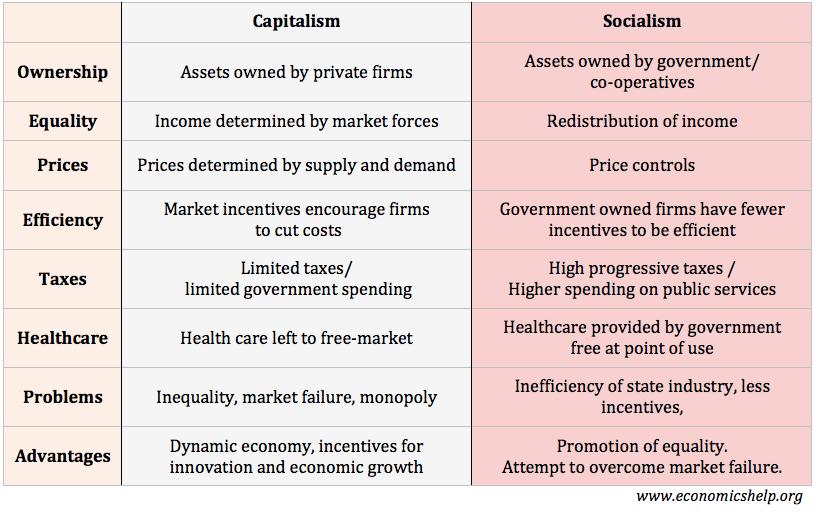Part two of a two-part series.
Socialism Does Not Create Equality
Proposed tax increases are just the beginning, as many in Congress are advocating to replace capitalism with socialism.
While no system is perfect, capitalism generally provides equality of opportunity. Every American is entitled to a public education and those who study hard should be able to advance through college and have successful careers. If not everyone is getting there, maybe the public education system, not capitalism, is at fault.
Regardless of its faults, the U.S. has succeeded historically by providing greater opportunity than other countries.
One goal of socialism is equality of outcome, which removes the incentive to strive to be successful. The only way to get ahead in socialist countries is to be politically active or to resort to crime (or, as is often the case, both). Would-be entrepreneurs don’t bother starting businesses and innovation dies. The standard of living falls for everyone and the poor become even poorer.
And, in spite of the promise of equality, it does not exist in socialist countries, as party leaders thrive at the expense of everyone else. In fact, socialist and Communist countries have even greater inequality than exists in the U.S. Per capita income in China is $8,254, which is about a fifth the size of per capita income in the U.S. Meanwhile, President Xi Jinping has a net worth exceeding $1.5 billion. Per capita income in Russia is the equivalent of $5,885, while President Vladimir Putin has a net worth estimated to be as high as $200 billion.
While leaders of socialist countries are often worth billions, their citizens are usually starving to death and lack many of what we consider to be life’s essentials, such as running water and shoes. Venezuela has the world’s largest oil reserves, but Communist mismanagement has left the country with less than $1 billion in cash — less than the net worth of rapper Jay-Z and reality star Kylie Jenner.
And while there are still too many poor Americans, census data show they are not nearly as poor as those in socialist countries. Among those in the U.S. who are classified as being “poor,” 76% have air conditioning, 66% have more than two rooms of living space per person, 97% own at least one color television, 62% have either cable or satellite television, almost 75% of households own a car, 99% have refrigerators, and virtually none lack running water or flushing toilets. In addition, 46% own their home, the average of which is a three bedroom house with 1.5 baths and the average value of which is 70% of the median American home.
Not Quite Capitalism
Even without radical changes, the U.S. economy combines aspects of socialism and capitalism. Our Social Security system, for example, provides a guaranteed income for retirees and people who are disabled, while Medicare provides guaranteed healthcare. But programs being proposed would move the U.S. much closer to socialism.
Among the proposals are legislation that would end the ability of heirs to step up the cost basis of inherited property to its value at the time of its previous owner’s death and a wealth tax on Americans who have more than $50 million in assets. The 99.5 Percent Act would reduce federal estate and gift tax exemptions; increase estate, gift, and generation-skipping tax rates, and alter the use of trusts for estate planning.
The Biden Administration would also increase the refundable “child tax credit,” which provides extensive welfare cash grants to families that owe no taxes. The proposal would increase the refundable credit from $2,000 per child under 17 to $3,000 for children age six to 17, and $3,600 for children under six. The proposal would also remove existing work requirements from the child cash grants. The Heritage Foundation says the Biden plan “would constitute the second-largest expansion of means-tested welfare entitlements in U.S. history.”
While advocates say the spending would reduce child poverty, Heritage notes that the U.S. spent nearly $500 billion on means-tested cash, food, housing, and medical care for poor and low-income families with children in 2018.
That amount was seven times the amount Census figures showed would be needed to eliminate all child poverty in the U.S. So if we spent that amount and still have poverty, maybe we have the wrong goal. Instead of spending trillions on making everyone’s income more equal, we should focus on making everyone’s income higher by implementing policies that will help the economy grow.
We Need Rich People
To help the economy grow, it will have to have more rich people.
Whether they choose to or not, wealthy people often contribute a great deal to society. They often run businesses that employ dozens, hundreds or even thousands of people. The business, the business owner and the company’s employees all are making a living because of the business, which is an added plus to the economy.
The wealth they generate is used to pay taxes. Because they pay more, in spite of tax breaks and loopholes, taxes for the rest of us undoubtedly would be much higher without them.
The wealthier people become, the more money they likely spend and the more money they pump into the system, the more they create ripples of growth throughout the economy.
And those with wealth are often philanthropic. According to The Philanthropy Roundtable, “High-income households provide an outsized share of all philanthropic giving. Those in the top 1% of the income distribution (any family making $394,000 or more in 2015) provide about a third of all charitable dollars given in the U.S. When it comes to bequests, the rich are even more important: the wealthiest 1.4% of Americans are responsible for 86% of the charitable donations made at death, according to one study.”
So we can increase taxes on the wealthy, but when we soak the rich, we all get wet.
